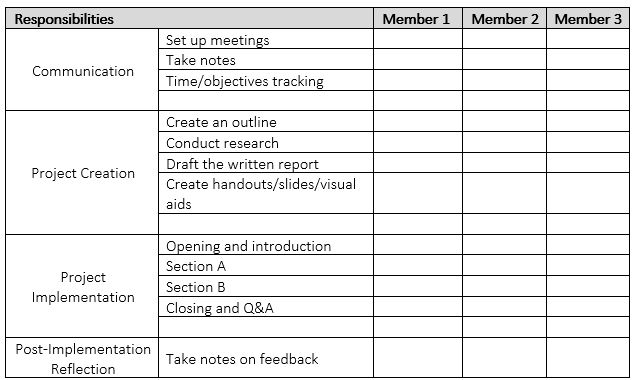The idea for sharing this post came from a session I recently conducted at the annual teaching conference organized by my university. A pedagogical conundrum was raised by a colleague whose enthusiasm and question stayed with me and inspired me to write this post. The question posed by this colleague is relevant to all instructors who have ever used group work to assess their students: How should one deal with the issues that arise when members of a group are not picking up their share of the responsibilities during a group work project?
Read more ›CURRENT ARTICLE • September 29
OTHER RECENT ARTICLES
Many faculty now have students do some graded work in groups. The task may be, for example, preparation of a paper or report, collection and analysis of data, a presentation supported with visuals, or creation of a website. Faculty make these assignments with high expectations. They want the groups to produce quality work—better than what the students could do individually—and they want the students to learn how to work productively with others. Sometimes those expectations are realized, but most of the time there is room for improvement—sometimes lots of it. To that end, below is a set of suggestions for improving group projects. A list in the article referenced below provided a starting place for these recommendations.
Read More ›The explosion of educational technologies in the past decade or so has led everyone to wonder whether the landscape of higher education teaching and learning will be razed and reconstructed in some new formation. But whatever changes might occur to the learning environments we construct for our students, the fundamental principles according to which human beings learn complex new skills and information will not likely undergo a massive transformation anytime soon. Fortunately, we seem to be in the midst of a flowering of new research and ideas from the learning sciences that can help ensure that whatever type of approach we take to the classroom—from traditional lecture to flipped classes—can help maximize student learning in our courses.
Read More › One of the activities I most struggle with as an instructor of visual communications is getting students to give thoughtful and detailed critiques of their fellow students’ work. The critique process for students is challenging for several reasons.
One of the activities I most struggle with as an instructor of visual communications is getting students to give thoughtful and detailed critiques of their fellow students’ work. The critique process for students is challenging for several reasons.
 How often do you hear the following sentiments from students?
How often do you hear the following sentiments from students?
Those who teach in the health disciplines expect their students to retain and apply every iota of learned material. However, many students come to us having achieved academic success by memorizing the content, regurgitating that information onto an exam, and promptly forgetting a good portion of it. In health, as well as other disciplines where new material builds upon the material from the previous semesters, it is critical for students to retain what they learn throughout their coursework and as they begin their careers as a nurse, engineer, elementary teacher, etc.
Read More › At one time or another, most of us have been disappointed by the caliber of the questions students ask in class, online, or in the office. Many of them are such mundane questions: “Will material from the book be on the exam?” “How long should the paper be?” “Can we use Google to find references?” “Would you repeat what you just said? I didn’t get it all down in my notes.” Rarely do they ask thoughtful questions that probe the content and stir the interest of the teacher and other students.
At one time or another, most of us have been disappointed by the caliber of the questions students ask in class, online, or in the office. Many of them are such mundane questions: “Will material from the book be on the exam?” “How long should the paper be?” “Can we use Google to find references?” “Would you repeat what you just said? I didn’t get it all down in my notes.” Rarely do they ask thoughtful questions that probe the content and stir the interest of the teacher and other students.
 With increasing stridence, college students and their parents frame their educational expectations with a consumer paradigm, viewing professors as their employees, universities as consumer markets, and degrees as commodities. As a humanities professor, I have always bristled at this equation. However, I see a way to use this metaphor for good purpose. Rather than fight this flawed mentality, I present the consumer model during one of our first class sessions and engage students in an exploration of its applicability to the educational enterprise.
With increasing stridence, college students and their parents frame their educational expectations with a consumer paradigm, viewing professors as their employees, universities as consumer markets, and degrees as commodities. As a humanities professor, I have always bristled at this equation. However, I see a way to use this metaphor for good purpose. Rather than fight this flawed mentality, I present the consumer model during one of our first class sessions and engage students in an exploration of its applicability to the educational enterprise.
There has been significant and well-deserved attention paid to the first class. This class is critical in setting the tone and expectations of the course. Unfortunately, the same amount of attention has not been paid to the last day of class. To us, this class is as important as the first. It is the class where the professor has an opportunity to celebrate the learning of the students. Unfortunately, this day is usually saved for final exam review, finishing up projects or dealing with logistical details like date, time, and location of the final or where to pick up graded term papers. The course ends with a whimper instead of a bang.
Read More › The joy of discussion as a class activity is starting it up and seeing where it goes. Although some of the same themes come up in every discussion, how they emerge and the connections they raise vary as much as the individual students do. On a great discussion day, the talk flows freely in interesting and unexpected directions, much like jazz.
The joy of discussion as a class activity is starting it up and seeing where it goes. Although some of the same themes come up in every discussion, how they emerge and the connections they raise vary as much as the individual students do. On a great discussion day, the talk flows freely in interesting and unexpected directions, much like jazz.






